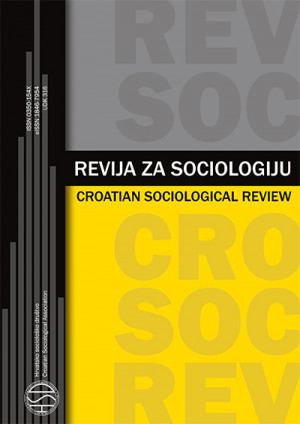Assessing Socioeconomic Inequality in Self-Rated Health in Four ex-Yugoslav Countries: Does Social Capital Play a Role?
Assessing Socioeconomic Inequality in Self-Rated Health in Four ex-Yugoslav Countries: Does Social Capital Play a Role?
Author(s): Luka JurkovićSubject(s): Social differentiation, Health and medicine and law
Published by: Hrvatsko sociološko društvo
Keywords: health inequalities; self-rated health; socioeconomic status; social capital; ex-Yugoslavia;
Summary/Abstract: There has been a growing academic interest in explaining the well-established association between socioeconomic status and health. Among the various proposed mechanisms and pathways, social capital has been recognised as a potentially important antecedent of socioeconomic inequalities in health. However, these interrelationships remain relatively unexplored within the countries of former Yugoslavia. Therefore, this article aims to fill the gap in the literature by exploring the role of individual-level social capital in the relationship between socioeconomic status and self-rated health in four ex-Yugoslav countries. The present study is based on the data from the ninth round of the European Social Survey (2018). The author analysed the data of participants aged 25 and over from Croatia (N = 1534), Montenegro (N = 1002), Serbia (N = 1720) and Slovenia (N = 1149). In order to test the target associations, sequential multivariate logistic regression analysis was performed. The results show that occupational social class and several social capital indicators are associated with self-rated health, although independently of each other. Across all countries, unskilled and skilled manual workers and long-term unemployed individuals were more likely to report poor health compared to non-manual workers, with the exception of Montenegrin skilled manual workers and the long-term unemployed participants from Slovenia. Moreover, despite some cross-country differences in the relationship between individual levels of social capital and self-rated health, social participation was associated with self-rated health across all countries. These findings highlight the importance of encouraging social participation within these countries, which can lead to health benefits through behavioural and psychosocial mechanisms.There has been a growing academic interest in explaining the well-established association between socioeconomic status and health. Among the various proposed mechanisms and pathways, social capital has been recognised as a potentially important antecedent of socioeconomic inequalities in health. However, these interrelationships remain relatively unexplored within the countries of former Yugoslavia. Therefore, this article aims to fill the gap in the literature by exploring the role of individual-level social capital in the relationship between socioeconomic status and self-rated health in four ex-Yugoslav countries. The present study is based on the data from the ninth round of the European Social Survey (2018). The author analysed the data of participants aged 25 and over from Croatia (N = 1534), Montenegro (N = 1002), Serbia (N = 1720) and Slovenia (N = 1149). In order to test the target associations, sequential multivariate logistic regression analysis was performed. The results show that occupational social class and several social capital indicators are associated with self-rated health, although independently of each other. Across all countries, unskilled and skilled manual workers and long-term unemployed individuals were more likely to report poor health compared to non-manual workers, with the exception of Montenegrin skilled manual workers and the long-term unemployed participants from Slovenia. Moreover, despite some cross-country differences in the relationship between individual levels of social capital and self-rated health, social participation was associated with self-rated health across all countries. These findings highlight the importance of encouraging social participation within these countries, which can lead to health benefits through behavioural and psychosocial mechanisms.
Journal: Revija za sociologiju
- Issue Year: 51/2021
- Issue No: 3
- Page Range: 409-429
- Page Count: 22
- Language: English

